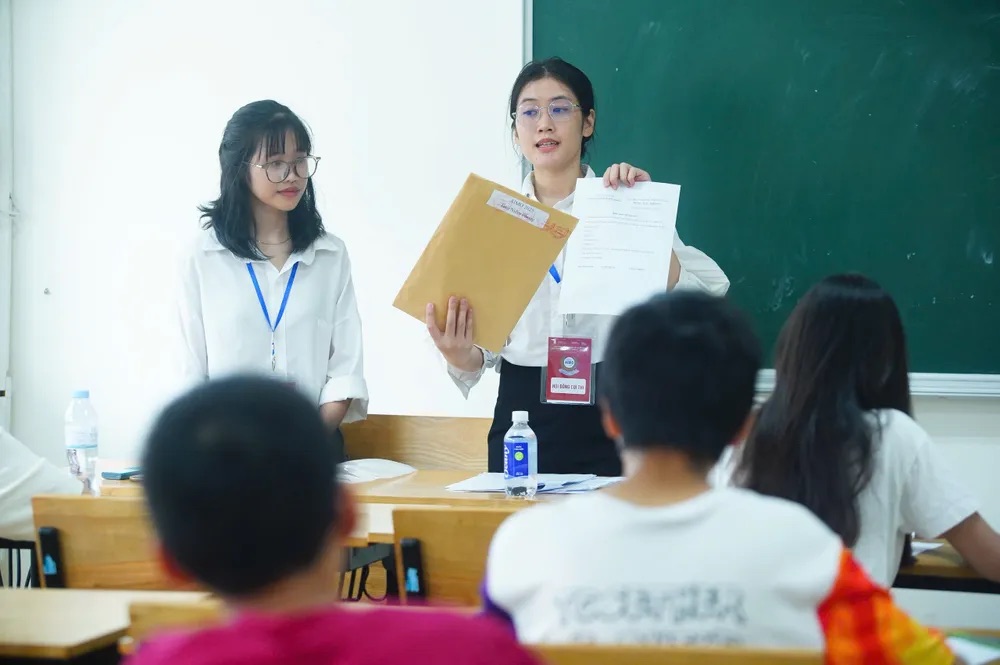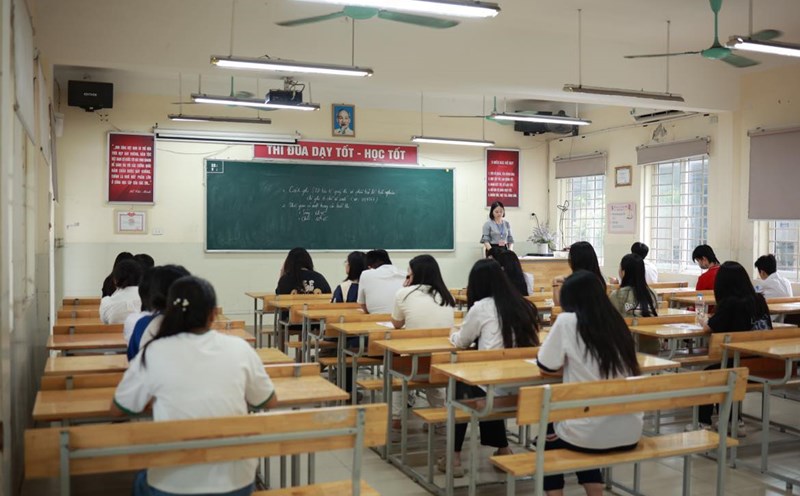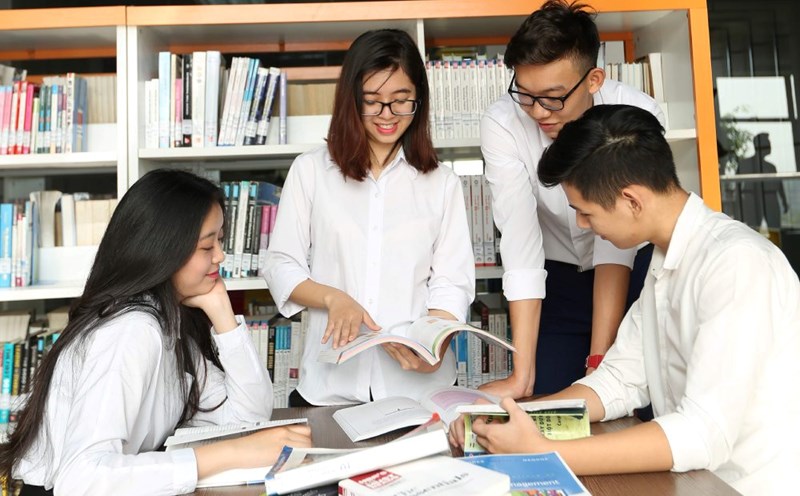In the process of national development, our Party and State always consider education and training, along with science and technology, as the top national policy. Many major policies and guidelines have been issued, promoting innovation and strong development in education and training, achieving important results.
Vietnam is among the 21 countries that are early to achieve the United Nations' Sustainable Development Goals for quality education by 2030. However, education and training still face many difficulties and limitations, and has not really become a key driving force for the country's breakthrough development. Education access is still low compared to developed countries; there are major differences between regions and target groups.

The country enters a new stage of development with the requirement to build a high-quality human resource, form a new generation of Vietnamese citizens with patriotism, national pride, bravery, intelligence, health and the ability to integrate internationally. This requires a sudden development of education and training. Breakthroughs in education and training development must start from innovation in thinking, awareness and institutions.
From the above reality, the Politburo directs that there must be a breakthrough in the development of education and training.
Below are the breakthroughs of the Resolution:
Vietnam aims to have 5 universities in the world's top 100
The Politburo sets a goal that by 2030, it will strive to have at least 8 higher education institutions in the top 200 universities in Asia, at least higher education institutions in the top 100 universities in the world in some fields according to prestigious international rankings.
Complete phoising preschools 3-5 years old, phoising secondary schools; at least 85% of young people have completed high school; 80% of high schools meet national standards; 100% of universities, 80% of vocational schools meet national standards; strive to have 1 university in the top 100 in the world in some fields.
Strive to complete high school generally; at least 2 universities are in the top 100 in the world. Vision 2045: Vietnam possesses a modern, fair, and quality education system, in the top 20 countries in the world; at least 5 universities are in the top 100 in the world by 2035.
These are practical goals, in line with the aspiration to develop a prosperous and powerful country by 2045.
Increase spending on education, increase teacher allowances
The Politburo stated that there should be specific policies and incentives for the teaching staff, including raising the minimum allowance by 70% for preschool and general education teachers; 100% for teachers in disadvantaged areas. Increase spending on education by at least 20% of the state budget, of which at least 5% is for investment. Build a mechanism to attract talent, create conditions for schools to be autonomous and mobilize social resources.
The state budget is allocated to higher education institutions and vocational training institutions based on mission, quality and efficiency according to a unified mechanism in the whole industry; priority is given to ordering and assigning tasks to key industries and fields according to output results.
The state budget for education and training reaches at least 20% of total state budget expenditure, of which the allocation of investment expenditure reaches at least 5% of the total state budget target and expenditure for higher education reaches at least 3% of total state budget expenditure.
Expand preferential financial support policies and credit for learners, not allowing students to drop out of school due to financial conditions. Develop and implement a Talent Training Project, prioritizing basic science, engineering and technology. Establish a National Scholarship Fund and effectively promote other talent promotion and learning promotion funds from the state budget and other legal sources to encourage learning and developing the education career
Providing a unified set of textbooks nationwide
The Politburo requires strengthening comprehensive education on virtue, intelligence, body, and aesthetics, forming a new-era Vietnamese value system; comprehensive digital transformation, popularization and application of digital technology and artificial intelligence.
The education sector needs to strengthen ideological education, tradition, ethics, physical fitness, aesthetics, career guidance education, soft skills; increase the duration of science, technology, information technology, art; research to include knowledge about digital abilities and artificial intelligence in general education programs.
The Politburo requested to review and evaluate the implementation of the General Education Program; ensure the provision of a unified set of textbooks nationwide, striving to provide free textbooks to all students by 2030.
In addition, the Politburo also requires that by 2030, strive to provide free textbooks to all students.
dissolving universities without success, developing 3-5 elite universities
The Politburo directs the urgent development of a strategic framework for the development of higher education. Implement the arrangement and restructuring of higher education institutions; merge and dissolve substandard higher education institutions; eliminate intermediate levels, ensure streamlined, unified and effective governance; study the merger of research institutes with higher education institutions; strengthen state management of higher education institutions, research the transfer of some universities to local management to improve management efficiency and better meet local human resource training requirements.
Invest in modernizing technical infrastructure, expanding development space for higher education institutions to operate effectively. Focus on investing in upgrading facilities, laboratories, building excellent training and research centers at key higher education institutions and teacher training institutions.
The Politburo also requires special and outstanding mechanisms to be invested in to develop 3 to 5 elite universities according to the model of international-class research universities, training national talents.
Prioritize the allocation of funding for scientific research, especially basic research associated with postgraduate training at higher education institutions.
Encourage planning and construction of high-tech urban areas - universities; strongly promote the development of higher education institutions according to the model of innovative universities, new-generation technology universities, becoming the locomotive, core in the innovation ecosystem of regions; support the effective implementation of cooperation between the State - Schools - Enterprises. There is an effective support mechanism for lecturers and learners to implement startup projects, innovate, establish start-up companies, and startup companies.
Expanding training programs and projects, developing the teaching staff, increasing support policies for lecturers studying to improve their qualifications at home and abroad.
Build a program to attract excellent lecturers from abroad with outstanding incentives. At the same time, strongly innovate training programs according to international standards; integrate content on data analysis and artificial intelligence, entrepreneurship and entrepreneurship.
Support the expansion of talent training programs, postgraduate training combined with scientific research, innovation in basic science, engineering and technology, especially strategic technology, cutting-edge technology of industry 4.0, sectors serving key national projects. Link training activities with research, development of science, technology, innovation, national digital transformation.
The Politburo also directed the development of a university admission innovation project in the direction of properly assessing learners' abilities, ensuring unified control of input standards for training majors and training institutions and strictly controlling output quality. Strengthen quality management associated with appropriate support policies for doctoral training, training in pedagogical majors, health, law and key majors; strictly regulate doctoral studies for cadres and civil servants.











